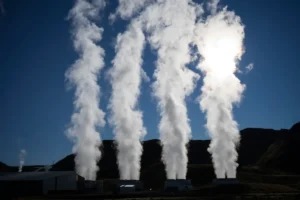Humboldt County well shows big promise for geothermal power
Pumpernickel shows limited surface signs of geothermal activity and, while it was briefly explored in the past, the site had mostly been ignored until now….It could be the state’s largest geothermal power facility, supplying reliable, carbon-free electricity to the grid within three years.
… Zanskar believes there are a lot more conventional geothermal systems that haven’t been discovered in Nevada — geothermal upwellings that don’t reach the surface, he said. “The only way to really discover them is to drill,” Holcomb said.
… Experts at Zanskar use artificial intelligence to expedite and increase the accuracy of the company’s predictions related to areas for exploration and temperature, DeReuil said.












